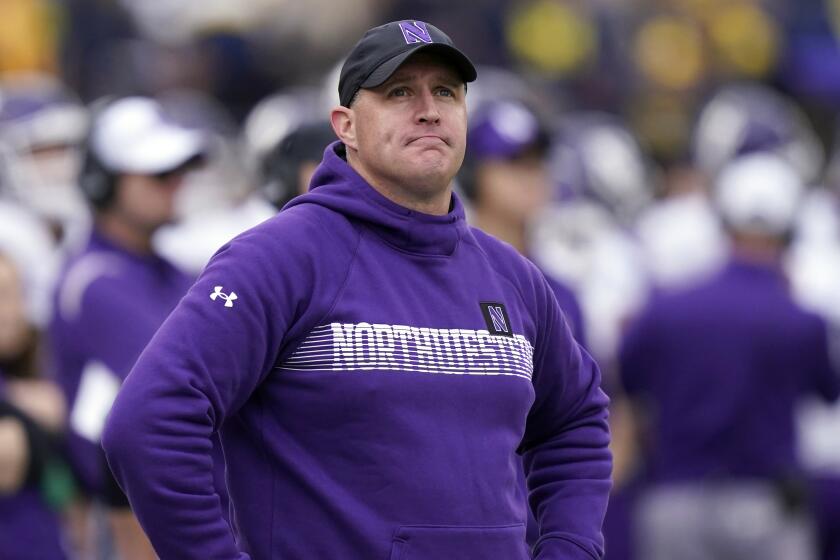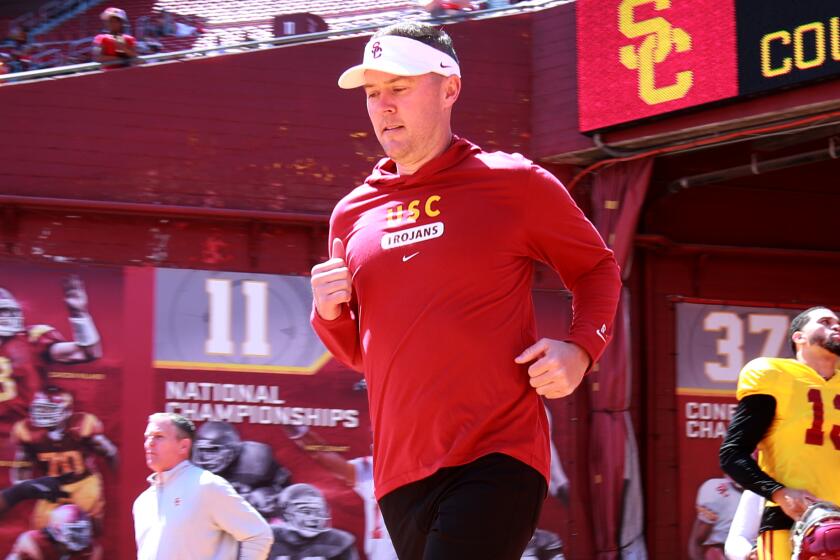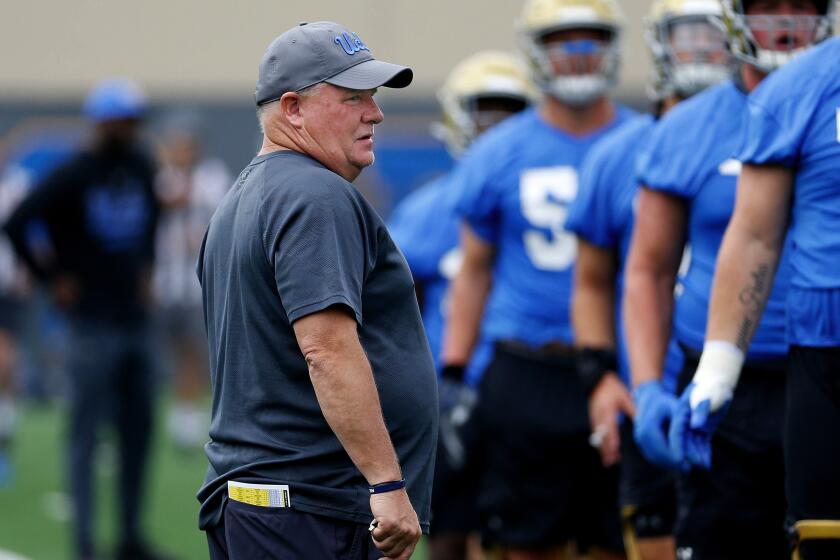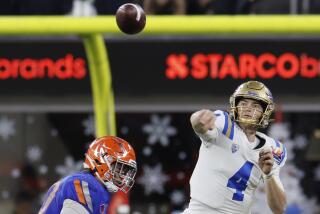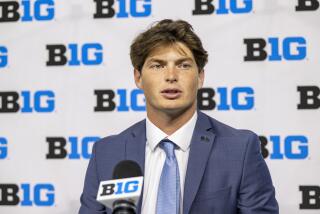Proposed bill could protect UCLA, USC from becoming another Northwestern
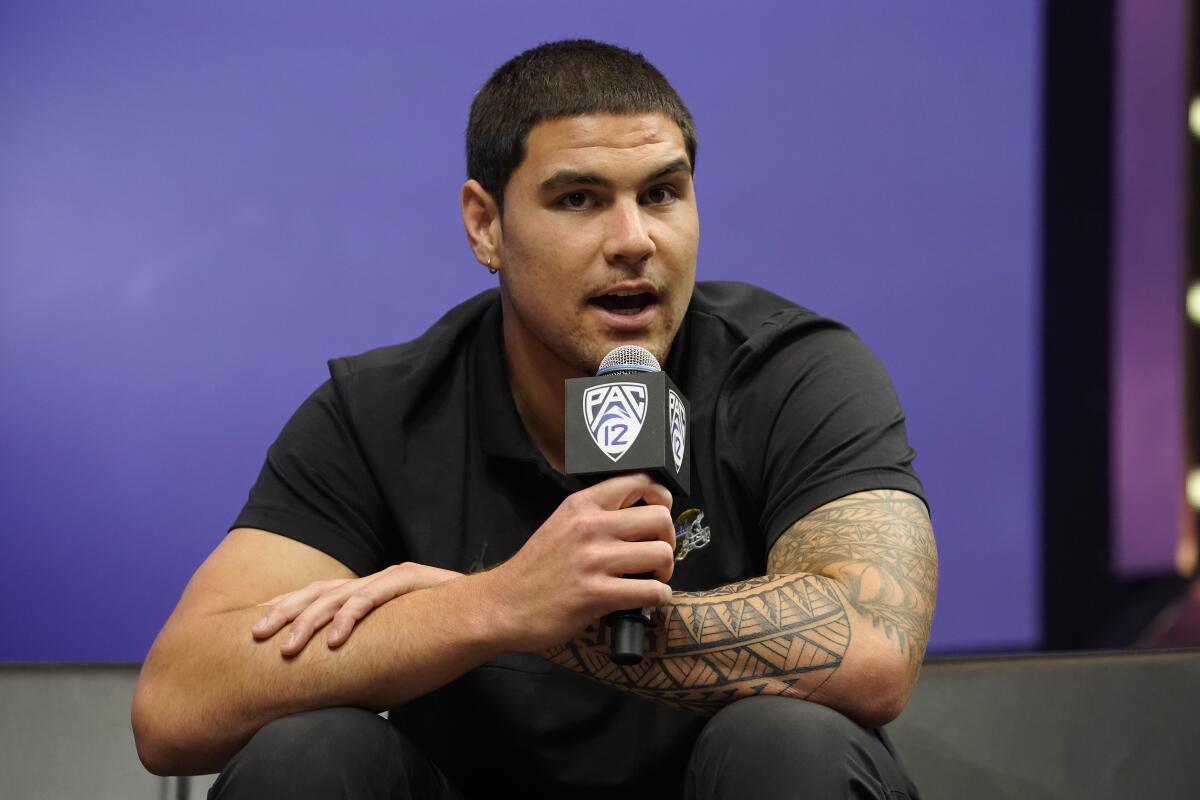
Before a group of UCLA players commenced a recent summer weightlifting session, a strength coach gave a stomach-turning rundown of the hazing allegations at Northwestern that have rocked the college football world.
When he was finished, the coach delivered a reminder.
“It was just like, ‘Y’all know that’s not tolerated,’ ” Bruins edge rusher Laiatu Latu recalled Friday at Pac-12 media day at Resorts World Las Vegas.
In his mind, Latu went over the list of accusations. None of it sounded even vaguely familiar to anything he had experienced at UCLA given the no-nonsense culture established by coach Chip Kelly and his players.
“That’s never been really a thing with us,” Latu said. “It’s all business once you step into the UCLA locker room. I feel like we’re so focused on what we want to accomplish in workouts and all that, we don’t even think about treating the freshmen or newcomers a certain way.”
Northwestern fires football coach Pat Fitzgerald amid a hazing scandal that called into question his leadership and damaged the university’s reputation.
Since the NCAA freely admits it cannot police hazing, players and coaches from across the Pac-12 said it’s up to them to prevent the sort of situation that cost Northwestern coach Pat Fitzgerald his job. Another safeguard could be on the way, at least for UCLA, USC and other schools within California.
Legislation that passed the California Assembly last month known as the College Athlete Protection Act, or A.B. 252, could help prevent the kind of alleged abuses that occurred at Northwestern and other schools across the country, including UCLA under former coach Jim Mora. In 2019, four former Bruin offensive linemen — Kenny Lacy, John Lopez, Poasi Moala and Zach Batemen — filed lawsuits against their alma mater claiming that coaches and trainers mishandled serious injuries and expected them to play through pain.
Those lawsuits, which were settled last year for undisclosed amounts, contended that Mora, offensive line coach Adrian Klemm and associate trainer Anthony Venute improperly addressed injuries, regularly ignoring or minimizing concerns about pain that players had reported while allowing their symptoms to worsen.
Lopez’s lawsuit stated that Klemm compounded a concussion the offensive lineman had suffered during a 2013 training camp in San Bernardino, designing a drill in which his teammates were encouraged to “f— him up!” According to the lawsuit, Klemm allegedly “made it a priority to shame John by unfairly reprimanding, chastising, disciplining and cursing out” the player.
Entering Year 2 of his USC coaching tenure, Lincoln Riley says college football needs the Trojans to be a national power and elevate the West Coast.
“Unfortunately, there’s nothing in place to protect these athletes and there have been so many harrowing stories of what has happened because of that,” said Pamela Tahim Thakur, an attorney who represented the UCLA players. “There’s so many other stories, we’re just a minuscule fraction.”
Player safety advocates say the College Athlete Protection Act would help shield the 50,000 college athletes in the state from bad behavior. Among other things, the bill would establish standards to prevent and address abuse, serious injury or death in addition to setting guidelines for mental health care.
The passage of the bill, which faces a vote in the state’s senate education committee, would allow athletes to file a complaint when witnessing or being subject to a safety violation, allowing an independent third party to investigate and penalize violators. In extreme cases involving sexual abuse or player death, offenders such as team doctors, trainers or coaches could be permanently banned from college athletics.
These measures could help prevent situations like the massive scandal at San José State, where the school’s former sports medicine director faces charges that he sexually abused more than two dozen female athletes, and the 2014 tragedy at California, where football player Ted Agu collapsed and later died from sickle-cell trait complications after being forced to hold a rope alongside teammates while running at full speed.
“Currently, the NCAA does not enforce safety standards,” said Ramogi Huma, a former UCLA linebacker and current president of the National College Players Assn. “It’s not against NCAA rules to sexually abuse an athlete, force an athlete with a concussion back into the same game or kill an athlete in a hazardous workout. NCAA sports treats athletes like disposable property rather than people.”
UCLA has a quarterback battle on its hands between five-star recruit Dante Moore and redshirt junior Ethan Garbers. What does Chip Kelly have to say?
A rash of lawsuits against Northwestern, seemingly growing by the day, illustrates the fallout possible without adequate protections in place. Among other things, Fitzgerald’s former players alleged they were subjected to “dry-humping” by teammates and forced to practice quarterback-center exchanges in the locker room while naked. A university investigation concluded before Fitzgerald was fired that there was a pattern of “forced participation, nudity and sexualized acts of a degrading nature.”
Fitzgerald has maintained he was unaware of the hazing rituals, but one player told USA Today Sports that Northwestern associate head coach Matt MacPherson witnessed players performing naked pull-ups in addition to other hazing rituals.
Head coaches know they are ultimately on the hook for whatever happens within their program, regardless of whether they see any bad behavior themselves.
“It doesn’t seem like any one person can be responsible and liable for everybody and everything, but that’s the way it is,” said Arizona coach Jedd Fisch, who spent the 2017 season as UCLA’s offensive coordinator under Mora. “When it comes down to hazing with our team, we’ve made it perfectly clear: that’s not something going to exist, can exist or should ever exist.”
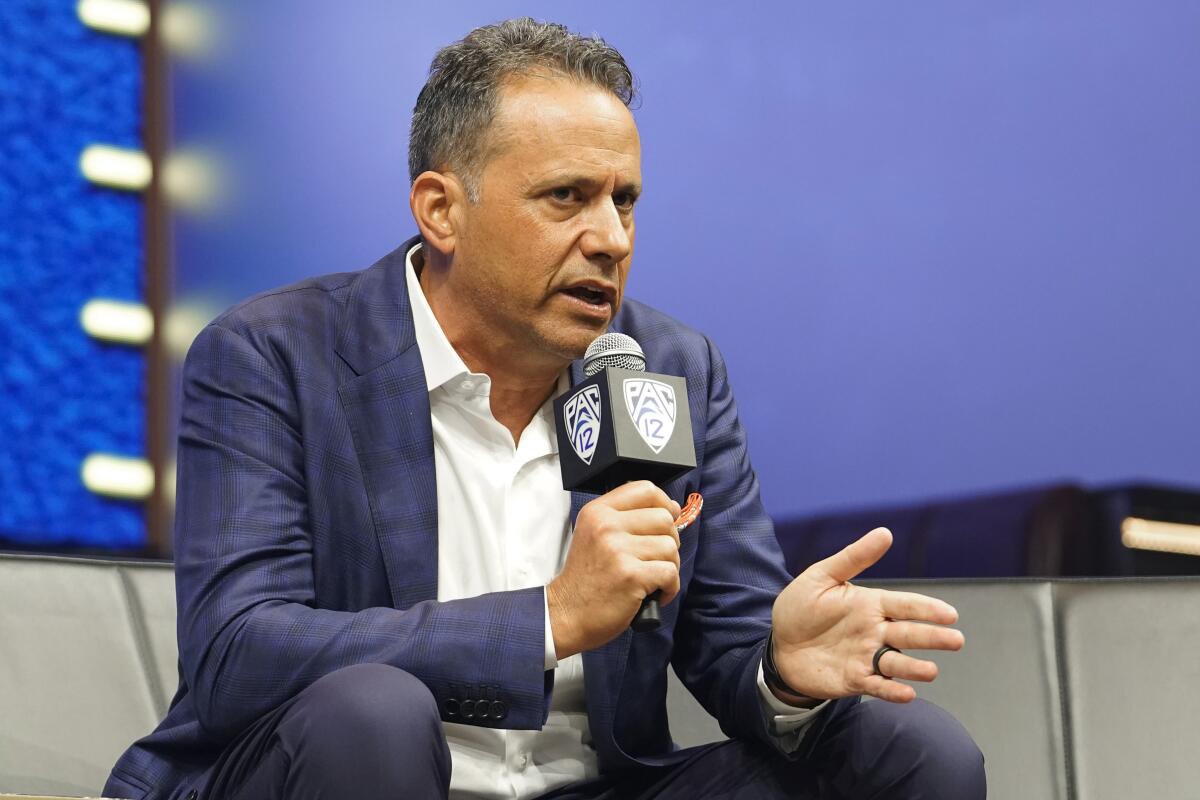
But where do you draw the line between discipline and hazing? At UCLA, running backs who fumble in practice must stay afterward to roll across the often blazing artificial turf while holding the football as part of a punishment devised by running backs coach DeShaun Foster.
“I think hazing is something that people do that no one wants done to them,” Kelly said, “and I think if someone had ever objected to DeShaun — and I don’t think anybody ever has, so.”
Another issue teams face is avoiding factions based on performance or seniority. Latu said when he was at Washington, only players who had participated in the game were allowed to dance in the locker room afterward. Freshmen have historically been among the biggest targets of hazing rituals.
Kelly said he addresses hazing whenever a new group of players arrives, letting them know they’re on equal footing with everyone else on the team.
“Everybody has to be treated the same whether you’re a freshman, you just got there, you’re a fifth-year senior or in the case of some of our guys, sixth-year seniors who have been around for a long time,” Kelly said. “Just because you’ve got a longer residence at a school, you don’t get any extra privileges. We want everybody to be treated with respect.”
A similar theme was sounded by USC quarterback Caleb Williams, who said having fun is one thing and making teammates uncomfortable is something else entirely.
“I mean, it’s not right, anything like that, to be treating your brothers with anything but respect,” Williams said. “Yeah, they’re brothers, you joke around, you laugh a lot, but to do anything to harm them or put them in jeopardy is wrong, so we don’t do anything like that in our locker room.”
More to Read
Go beyond the scoreboard
Get the latest on L.A.'s teams in the daily Sports Report newsletter.
You may occasionally receive promotional content from the Los Angeles Times.

